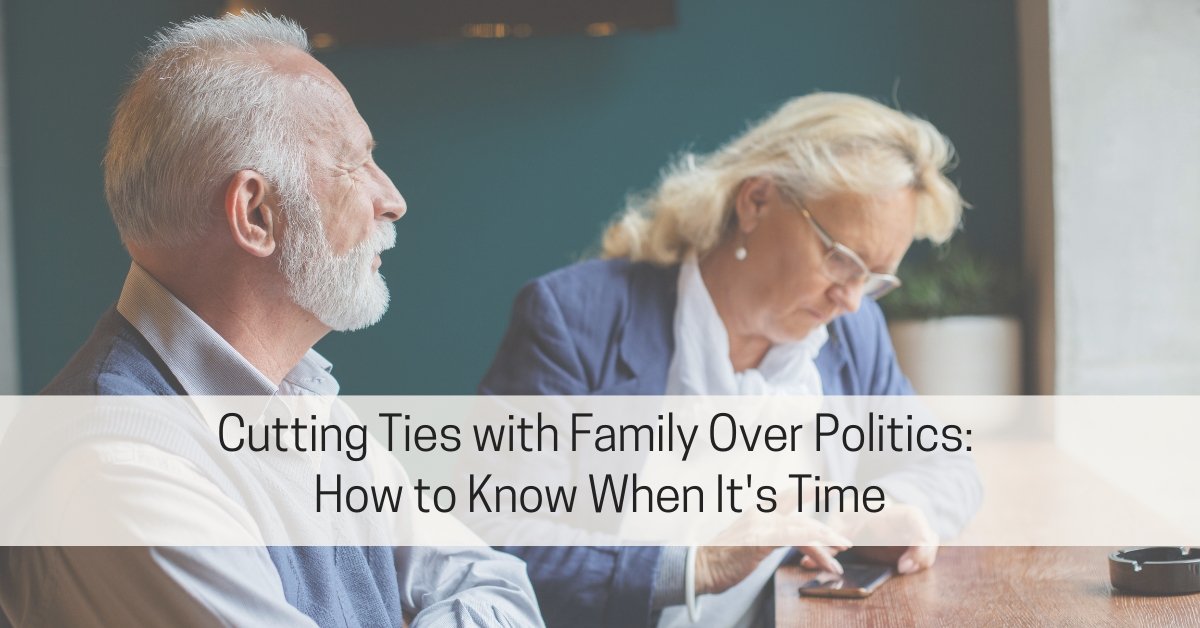If you’re reading this, you’re probably grappling with one of the most difficult decisions a person can face: cutting ties with family over politics. You might be questioning whether you’re overreacting, wondering if you’re being too sensitive, or feeling guilty about distancing yourself from people who raised you or shared your childhood.
Let me be clear from the start—what you’re experiencing goes far beyond typical political disagreements. When family members embrace beliefs that threaten your safety or identity, dismiss your commitment to human rights for all people, or reject your fundamental values about equity and the inherent worth and dignity of all people, you’re not dealing with politics. You’re dealing with a profound moral divide that can make maintaining relationships with some harmful to your well-being.
Why Family Political Conflicts Are Really About Values
Traditional political differences involve policy debates, such as how much to spend on infrastructure, how to structure Social Security benefits, or whether to invest in renewable energy or fossil fuels. These disagreements, while sometimes heated, don’t typically challenge anyone’s basic humanity or right to exist safely in the world.
What many people face today is fundamentally different. When family members support a political party or administration that dehumanizes entire groups of people, dismisses the suffering of vulnerable communities, or threatens the safety of people you care about, you’re not arguing about government policies. You’re confronting a values system that conflicts with your core beliefs about human worth and dignity.
This distinction is important because it explains why standard advice, such as “just avoid talking about politics,” often fails. How do you avoid the topic when your family celebrates taking away your rights or those of your children, friends, or neighbors? How do you stay neutral when your family wants to deny basic services to people in need?
The Psychological Cost of Staying Connected to Far-Right Family
Many people considering cutting ties with family over politics struggle with guilt because they’ve been told that family should come first, no matter what. But maintaining relationships that require you to suppress your authentic self or stay silent about fundamental injustices takes a serious psychological toll. As I discuss in my book, “Cutting Ties with Your Parents,” this guilt is misplaced. Protecting your well-being from harmful relationships is not wrong, bad, or selfish. It’s a healthy decision.
Mental health professionals recognize that chronic exposure to invalidating environments where your core values and concerns are consistently dismissed can take a serious toll on mental health and contribute to anxiety, depression, and erosion of self-worth. When family gatherings consistently leave you feeling angry, exhausted, or emotionally unsafe, your nervous system is sending you important information that the relationship is negatively affecting your health.
When to Cut Ties Over Politics
Not every political disagreement warrants ending a relationship, but certain patterns indicate that it has moved into harmful territory. Pay attention to these warning signs:
- Your family members consistently dismiss your lived experience or expertise. If you’re a healthcare worker and relatives call your pandemic concerns “fearmongering,” or you’re an educator and family members dismiss your observations about book bans affecting your students, they’re not just disagreeing with policy—they’re invalidating your professional knowledge and personal reality.
- Human rights are treated as optional or personal opinions. When family members frame basic dignity and safety for marginalized communities as debatable topics rather than fundamental rights, they’re revealing values that may be incompatible with yours.
- You have to manage their emotions about your identity or values. For example, if you’re an LGBTQ+ person and have to reassure relatives that you’re not judging their religious beliefs while they vote against your civil rights, or if you’re constantly explaining why homophobic comments hurt you, you’ve become responsible for managing their feelings about your identity.
- The relationship requires you to betray your integrity. If staying connected means staying silent while people you love are harmed by policies your family supports, or pretending to agree with viewpoints that violate your conscience, the relationship has become psychologically unhealthy.
As you consider how to proceed, ask yourself these questions:
- Do I consistently feel worse about myself after family interactions?
- Do I need to abandon my authentic self or my values to maintain a relationship with my family?
- Do my family members respect my boundaries when I set them?
- Do they show genuine interest in understanding my perspective?
- Do I spend more energy managing their emotions than expressing my own?
If you answered yes to the first two questions and no to the last three, cutting ties may be necessary for your well-being.
Self-Protection Strategies
If you’ve concluded that your family relationships are detrimental, these suggestions can help you take steps to protect yourself and move forward.
- Try low contact boundaries first. Before cutting ties completely, most people try to reduce the frequency of interactions and establish firm limits about what they will and will not discuss. If family members can’t respect these low-contact boundaries or continue bringing up divisive topics despite your requests, you may need to consider moving to no contact. Remember, it’s perfectly reasonable not to want to associate with people whose values fundamentally conflict with yours, even when they’re family. You’re not required to maintain close relationships with people who support policies or hold beliefs that cause harm to others, regardless of blood relation. To learn more about setting effective boundaries, get a copy of The Better Boundaries Workbook. (Be sure to read the chapter on setting boundaries with difficult people.)
- Practice the gray rock method. This involves giving short, neutral responses to provocative comments. Avoid engaging with inflammatory statements or taking the bait when they attempt to start arguments. This is a helpful approach when you must interact with family members who consistently instigate or push their beliefs on you.
- Document your experiences. Keep notes about interactions that leave you feeling depleted or unsafe. This isn’t about building a case against your family; it’s about validating your own experience when guilt tries to minimize the harm you’ve experienced.
- Build your support network. Start investing more time and energy in relationships with people who share your values. Join community groups, volunteer organizations, or online communities where you can connect with like-minded individuals who understand your perspective.
- Let yourself grieve. Cutting ties with family over politics involves real loss—not just of the relationships as they were, but of the family you thought you had. Allow yourself to feel sad, angry, or confused about this loss without letting those emotions trap you in harmful relationships. Read more about grieving family estrangement in this article.
If you’re taking space or estranged from a parent, sign up for free supportive resources.
Final Thoughts
Cutting ties with family over politics doesn’t make you intolerant or selfish. It reflects that some differences run deeper than political preferences and reveal fundamental disagreements about human worth and dignity, making genuine intimacy impossible. You don’t owe anyone access to you, including family members, when it requires you to compromise your integrity or endure repeated invalidation. Remember, as I wrote in “Cutting Ties with Your Parents,” creating boundaries with harmful family members is the most loving thing you can do for yourself―and sometimes even for them.
©2025 Dr. Sharon Martin, LCSW. All rights reserved. Photos courtesy of Canva.com.
Publisher: Source link






